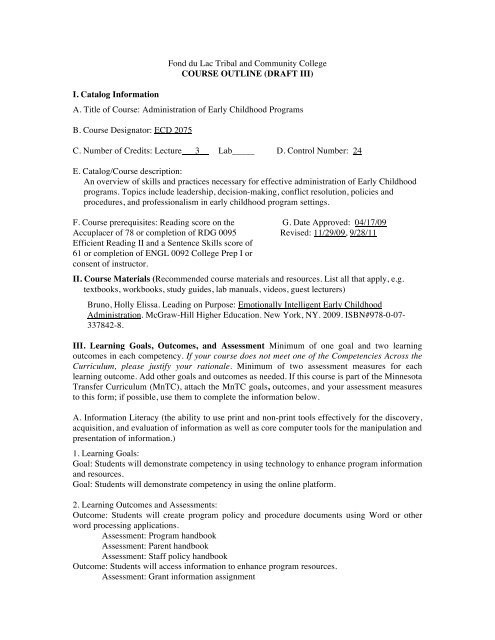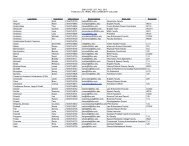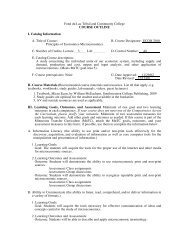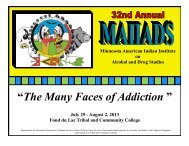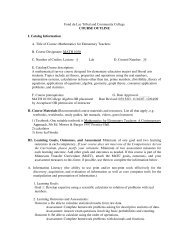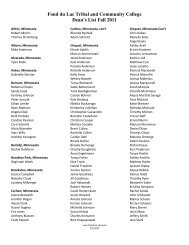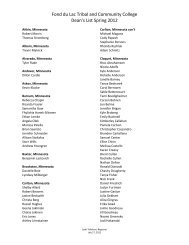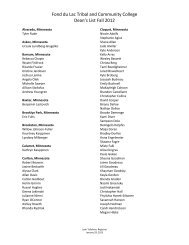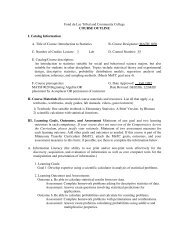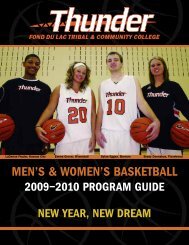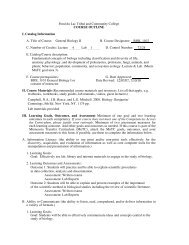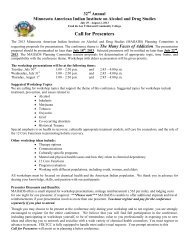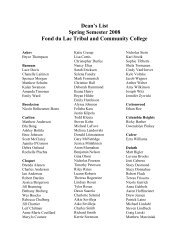ECD 2075 Administration of Early Childhood Programs
ECD 2075 Administration of Early Childhood Programs
ECD 2075 Administration of Early Childhood Programs
You also want an ePaper? Increase the reach of your titles
YUMPU automatically turns print PDFs into web optimized ePapers that Google loves.
I. Catalog Information<br />
Fond du Lac Tribal and Community College<br />
COURSE OUTLINE (DRAFT III)<br />
A. Title <strong>of</strong> Course: <strong>Administration</strong> <strong>of</strong> <strong>Early</strong> <strong>Childhood</strong> <strong>Programs</strong><br />
B. Course Designator: <strong>ECD</strong> <strong>2075</strong><br />
C. Number <strong>of</strong> Credits: Lecture___3__ Lab_____ D. Control Number: 24<br />
E. Catalog/Course description:<br />
An overview <strong>of</strong> skills and practices necessary for effective administration <strong>of</strong> <strong>Early</strong> <strong>Childhood</strong><br />
programs. Topics include leadership, decision-making, conflict resolution, policies and<br />
procedures, and pr<strong>of</strong>essionalism in early childhood program settings.<br />
F. Course prerequisites: Reading score on the G. Date Approved: 04/17/09<br />
Accuplacer <strong>of</strong> 78 or completion <strong>of</strong> RDG 0095 Revised: 11/29/09, 9/28/11<br />
Efficient Reading II and a Sentence Skills score <strong>of</strong><br />
61 or completion <strong>of</strong> ENGL 0092 College Prep I or<br />
consent <strong>of</strong> instructor.<br />
II. Course Materials (Recommended course materials and resources. List all that apply, e.g.<br />
textbooks, workbooks, study guides, lab manuals, videos, guest lecturers)<br />
Bruno, Holly Elissa. Leading on Purpose: Emotionally Intelligent <strong>Early</strong> <strong>Childhood</strong><br />
<strong>Administration</strong>. McGraw-Hill Higher Education. New York, NY. 2009. ISBN#978-0-07-<br />
337842-8.<br />
III. Learning Goals, Outcomes, and Assessment Minimum <strong>of</strong> one goal and two learning<br />
outcomes in each competency. If your course does not meet one <strong>of</strong> the Competencies Across the<br />
Curriculum, please justify your rationale. Minimum <strong>of</strong> two assessment measures for each<br />
learning outcome. Add other goals and outcomes as needed. If this course is part <strong>of</strong> the Minnesota<br />
Transfer Curriculum (MnTC), attach the MnTC goals, outcomes, and your assessment measures<br />
to this form; if possible, use them to complete the information below.<br />
A. Information Literacy (the ability to use print and non-print tools effectively for the discovery,<br />
acquisition, and evaluation <strong>of</strong> information as well as core computer tools for the manipulation and<br />
presentation <strong>of</strong> information.)<br />
1. Learning Goals:<br />
Goal: Students will demonstrate competency in using technology to enhance program information<br />
and resources.<br />
Goal: Students will demonstrate competency in using the online platform.<br />
2. Learning Outcomes and Assessments:<br />
Outcome: Students will create program policy and procedure documents using Word or other<br />
word processing applications.<br />
Assessment: Program handbook<br />
Assessment: Parent handbook<br />
Assessment: Staff policy handbook<br />
Outcome: Students will access information to enhance program resources.<br />
Assessment: Grant information assignment
Assessment: Leadership styles research assignment<br />
Assessment: Conflict resolution research assignment<br />
Outcome: Students will demonstrate capability in accessing online content, discussion board, and<br />
dropbox areas <strong>of</strong> online platform.<br />
Assessment: Read online PowerPoint lectures found in the Content area<br />
Assessment: Post and respond to the Discussion Boards<br />
Assessment: Upload assignments to the corresponding dropbox<br />
Outcome: Students demonstrate responsibility for accessing e-mail messages found in student<br />
FDLTCC account<br />
Assessment: Students log into student e-mail account<br />
Assessment: Reply to e-mail messages found in student FDLTCC account<br />
B. Ability to Communicate (the ability to listen, read, comprehend, and deliver information in a<br />
variety <strong>of</strong> formats.)<br />
1. Learning Goals:<br />
Goal: Students will examine leadership and program policies in early childhood programs.<br />
Goal: Students will use correct spelling, grammar, punctuation, sentence, and paragraph structure<br />
in written and oral communication.<br />
2. Learning Outcomes and Assessments:<br />
Outcome: Students will identify personal leadership style, strengths, and challenges<br />
Assessment: Students will identify, describe and analyze individual leadership styles,<br />
strengths, and challenges through written, oral, and/or visual means.<br />
Assessment: Students will describe and analyze the leadership skills required in early<br />
childhood programs.<br />
Outcome: Students will demonstrate program policies and procedures that articulate legal<br />
preventative measures.<br />
Assessment: Students will demonstrate program policies and procedures that articulate<br />
legal preventative measures through written, oral, and/or visual means.<br />
Assessment: Students will examine and evaluate written program policies and<br />
procedures.<br />
Outcome: Students will use appropriate spelling in written communication, especially by using<br />
the correct form <strong>of</strong> homophones such as there, they’re, their, to, too, two, hear, here, know, and<br />
no.<br />
Assessment: Online discussion board postings<br />
Assessment: Written assignments<br />
Outcome: Students will use appropriate sentence and paragraph structure in written<br />
communication.<br />
Assessment: Online discussion board<br />
Assessment: Competency statements<br />
Assessment: Research paper<br />
Assessment: Written assignments<br />
Outcome: Students will use correct grammar in oral communication<br />
Assessment: Class discussions<br />
Assessment: Oral presentation<br />
Assessment: Lab/Service Learning Evaluation<br />
Outcome: Students will coherently share their ideas orally, so that others can follow the train <strong>of</strong><br />
thought.<br />
Assessment: Class discussions<br />
Assessment: Lab/Service Learning Evaluation
Assessment: Oral presentation<br />
C. Problem Solving (the ability to conceptualize, apply, analyze, synthesize, and/or evaluate<br />
information to formulate and solve problems.)<br />
1. Learning Goals:<br />
Goal: Students will examine Pr<strong>of</strong>essionalism in <strong>Early</strong> <strong>Childhood</strong> <strong>Programs</strong><br />
2. Learning Outcomes and Assessments:<br />
Outcome: Students will craft a definition <strong>of</strong> pr<strong>of</strong>essionalism that embraces emotional and social<br />
intelligence.<br />
Assessment: Written assignment<br />
Assessment: Class discussion<br />
Outcome: Using the NAEYC Code <strong>of</strong> Ethics students will demonstrate ethical decision-making<br />
when presented with hypothetical situations common to early childhood program settings.<br />
Assessment: Written assignment<br />
Assessment: Class discussion<br />
D. Culture (knowledge <strong>of</strong> Anishinaabe traditions and culture, knowledge <strong>of</strong> one’s own traditions<br />
and culture, knowledge <strong>of</strong> others’ traditions and cultures, and respect for global diversity.)<br />
1. Learning Goals:<br />
Goal: Examine conflict situations as culturally based.<br />
2. Learning Outcomes and Assessments:<br />
Outcome: Students will examine conflicts between program staff as parents as differences in<br />
values and expectations.<br />
Assessment: Acknowledge, Ask, Adapt assignment<br />
Assessment: Reflective journal<br />
Outcome: Students will examine their cultural background.<br />
Assessment: Written assignment<br />
Assessment: Class discussion<br />
Documentation for MnTC - None<br />
IV. Course Content (Outline the major topics covered in this course.)<br />
1. Emotional Intelligence Competencies for leaders<br />
2. Social Intelligence in Leadership situations<br />
3. Leadership styles<br />
4. Decision making styles<br />
5. Leading change<br />
6. Policies and procedures: Federal, State, Tribal requirements<br />
7. Communication<br />
8. Supervision<br />
9. Budget overview: Federal, State, Tribal issues<br />
10. Facilities management: Federal, State, Tribal requirements<br />
11. Marketing overview<br />
12. Curriculum: Federal, State, Tribal requirements<br />
13. Working with families<br />
14. Pr<strong>of</strong>essionalism<br />
15. Leadership traits<br />
(revised October 2009)


